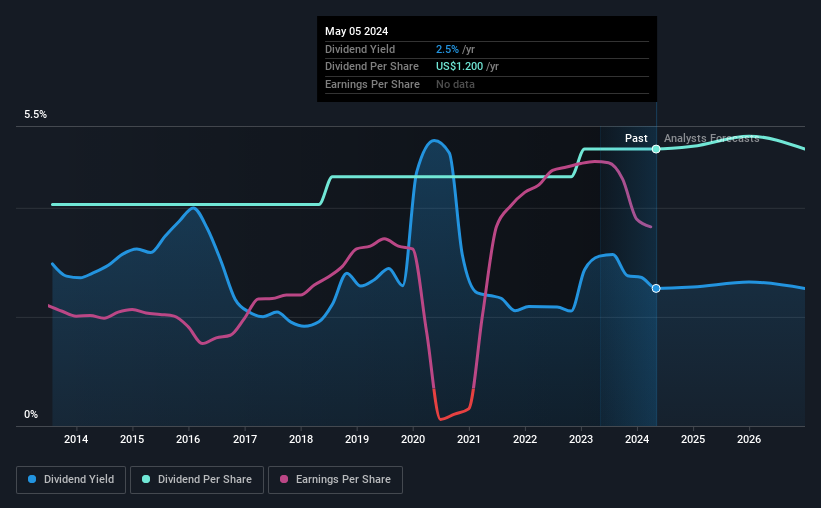- United States
- /
- Banks
- /
- NasdaqGS:HWC
Hancock Whitney (NASDAQ:HWC) Has Announced That It Will Be Increasing Its Dividend To $0.40
Hancock Whitney Corporation (NASDAQ:HWC) has announced that it will be increasing its periodic dividend on the 14th of June to $0.40, which will be 33% higher than last year's comparable payment amount of $0.30. Despite this raise, the dividend yield of 2.5% is only a modest boost to shareholder returns.
See our latest analysis for Hancock Whitney
Hancock Whitney's Earnings Will Easily Cover The Distributions
The dividend yield is a little bit low, but sustainability of the payments is also an important part of evaluating an income stock.
Hancock Whitney has established itself as a dividend paying company with over 10 years history of distributing earnings to shareholders. Taking data from its last earnings report, calculating for the company's payout ratio shows 28%, which means that Hancock Whitney would be able to pay its last dividend without pressure on the balance sheet.
Over the next 3 years, EPS is forecast to expand by 27.6%. Analysts forecast the future payout ratio could be 25% over the same time horizon, which is a number we think the company can maintain.

Hancock Whitney Has A Solid Track Record
The company has been paying a dividend for a long time, and it has been quite stable which gives us confidence in the future dividend potential. Since 2014, the dividend has gone from $0.96 total annually to $1.20. This works out to be a compound annual growth rate (CAGR) of approximately 2.3% a year over that time. While the consistency in the dividend payments is impressive, we think the relatively slow rate of growth is less attractive.
The Dividend's Growth Prospects Are Limited
The company's investors will be pleased to have been receiving dividend income for some time. However, Hancock Whitney has only grown its earnings per share at 2.5% per annum over the past five years. While growth may be thin on the ground, Hancock Whitney could always pay out a higher proportion of earnings to increase shareholder returns.
We Really Like Hancock Whitney's Dividend
Overall, we think this could be an attractive income stock, and it is only getting better by paying a higher dividend this year. Distributions are quite easily covered by earnings, which are also being converted to cash flows. All in all, this checks a lot of the boxes we look for when choosing an income stock.
Market movements attest to how highly valued a consistent dividend policy is compared to one which is more unpredictable. Meanwhile, despite the importance of dividend payments, they are not the only factors our readers should know when assessing a company. Companies that are growing earnings tend to be the best dividend stocks over the long term. See what the 10 analysts we track are forecasting for Hancock Whitney for free with public analyst estimates for the company. Looking for more high-yielding dividend ideas? Try our collection of strong dividend payers.
Valuation is complex, but we're here to simplify it.
Discover if Hancock Whitney might be undervalued or overvalued with our detailed analysis, featuring fair value estimates, potential risks, dividends, insider trades, and its financial condition.
Access Free AnalysisHave feedback on this article? Concerned about the content? Get in touch with us directly. Alternatively, email editorial-team (at) simplywallst.com.
This article by Simply Wall St is general in nature. We provide commentary based on historical data and analyst forecasts only using an unbiased methodology and our articles are not intended to be financial advice. It does not constitute a recommendation to buy or sell any stock, and does not take account of your objectives, or your financial situation. We aim to bring you long-term focused analysis driven by fundamental data. Note that our analysis may not factor in the latest price-sensitive company announcements or qualitative material. Simply Wall St has no position in any stocks mentioned.
About NasdaqGS:HWC
Hancock Whitney
Operates as the financial holding company for Hancock Whitney Bank that provides traditional and online banking services to commercial, small business, and retail customers in the United States.
Flawless balance sheet, undervalued and pays a dividend.
Similar Companies
Market Insights
Community Narratives



